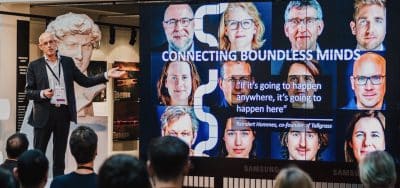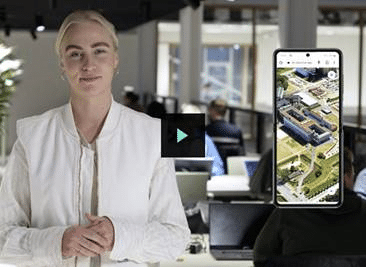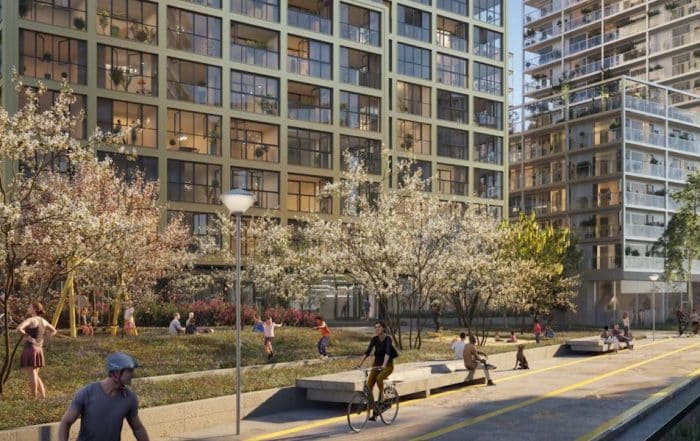Amsterdam Science Park: epicentrum van innovatie
Mensen bij elkaar brengen en zo belangrijke ontwikkelingen versnellen: Amsterdam Economic Board en Amsterdam Science Park hebben veel gemeen. Het gebied in Amsterdam-Oost is hard op weg om ‘de Zuidas van de bèta’ te worden. Hoe heeft directeur Leo le Duc, lid van onze Network Council, dat voor elkaar gekregen?

Leo le Duc, directeur Science & Business bij Amsterdam Science Park
Leo le Duc kijkt graag een paar jaar vooruit. Bij zijn aantreden in 2015 kondigde hij in het Parool aan dat het toen nog kale en winderige Amsterdam Science Park ‘de Zuidas van de bèta’ moest worden. Anno 2023 kijkt hij weer vijf jaar vooruit: Amsterdam Science Park moet dan veel meer een verblijfsgebied zijn, een gebied waar de innovatie doorheen stroomt. Een gebied waar studenten en onderzoekers wonen in shortstay-woningen. Tegen die tijd staat ook LabQ er, een gebouw dat het epicentrum van de Nederlandse quantuminnovatie wordt. Als het aan Le Duc ligt, is over vijf jaar ook een begin gemaakt met de A10-afslag richting Amsterdam Science Park. Zodat het gebied ook goed bereikbaar is voor de innovatieve ondernemers en wetenschappers die bijdragen aan de slimme, groene en gezonde toekomst van de Metropool Amsterdam.
Het Amsterdam Science Park is een samenwerking van de Universiteit van Amsterdam, de Nederlandse Organisatie voor Wetenschappelijk Onderzoek (NWO) en de gemeente Amsterdam, met als doel: onderwijs, wetenschap en bedrijfsleven bij elkaar brengen. De campus richt zich daarbij in het bijzonder op de thema’s deep tech, duurzaamheid, life sciences & e-health, en high-tech systemen en materialen. Gebouwen en buitenruimtes zijn gericht op ontmoeting tussen grote bedrijven, startups en wetenschappers. De grote kleurrijke picknicktafels, de zogenaamde Connectables, worden daarvoor veelvuldig gebruikt, net als de co-creatieruimtes en laboratoria. “Bedrijven die op zoek zijn naar kennis over deze onderwerpen kunnen bij ons terecht”, zegt Le Duc. “Dat is voor mij een belangrijke reden voor aansluiting bij de Network Council van Amsterdam Economic Board. Nog te veel bedrijven in de regio weten niet van ons bestaan.”
Digitale notaris
Niet alleen rond netwerkambities, ook op inhoudelijk vlak vinden Amsterdam Economic Board en Amsterdam Science Park elkaar. Zo werken de twee organisaties al jaren samen aan het initiatief AMdEX, dat een ‘digitale notaris’ ontwikkelt, die contracten levert aan organisaties die data willen delen zonder de controle hierover te verliezen. “Wij zijn allebei makelaars en schakelaars en begrijpen hoe we partijen rondom een onderwerp aan elkaar moeten verbinden”, zegt Le Duc. “Voor AMdEX worden nu de eerste testcases gedaan en ik hoop dat we hiermee over vijf jaar net zo’n rol vervullen voor data als het internetknooppunt AMS-IX doet voor internetverbindingen.”
Onder Le Ducs aanvoering wisten veel bedrijven de weg naar het Amsterdam Science Park te vinden. Zo werken in het AIR Lab onderzoekers en Ahold Delhaize samen aan maatschappelijk verantwoorde algoritmen. Deze bieden aanbevelingen aan consumenten en aan transparante AI-technologie voor het beheersen van goederenstromen.
Ook lopen er verschillende R&D-projecten met onder meer ASML, Nikon en Unilever. “Wat mij persoonlijk is tegengevallen in de afgelopen zeven jaar is dat ontwikkelingen niet zo snel gaan als ik misschien had gehoopt. Eerst dacht ik dat ik bedrijven en professoren gewoon met elkaar aan tafel kon zetten en dat het dan wel goed zou komen. Maar we merkten al snel: we spreken een verschillende taal. Bedrijven denken aan de korte termijn, die willen zo snel mogelijk resultaat. Professoren willen weten hoeveel PhD’ers de bedrijven willen financieren. In zo’n eerste gesprek kan dat natuurlijk ook afschrikken.”
Snuffelen
Inmiddels is de aanpak wat anders. Le Duc “We laten bedrijven en wetenschap eerst snuffelen aan elkaar met events en lezingen, zoals het Amsterdam Data Science-netwerk dat ook doet. We hebben nu bijvoorbeeld een paar innovatiecentra bij het informatica-instituut, waar langetermijnonderzoekslijnen lopen, en waar bedrijven wel periodiek resultaten te zien krijgen. Dat werkt goed.”
In het onlangs geopende gebouw Matrix One zit ook SustainaLab, waar Amsterdam Science Park studenten, bedrijven en onderzoekers bij elkaar brengt rond duurzaamheid. “Het is een ruimte voor co-creatie. Bedrijven werken in hun eigen labs aan hun eigen projecten en hier treffen ze mensen die ze verder kunnen helpen. Bijvoorbeeld met de sociaal-wetenschappelijke kant van een innovatie: hoe zorg je dat mensen er ook echt gebruik van gaan maken?”
Geen ‘mooi weer spelen’
Over de relatie tussen wetenschap en bedrijfsleven is de afgelopen jaren veel discussie. Eerder dit jaar bezetten enkele tientallen studenten een UvA-gebouw en eisten zij dat de universiteit haar banden met Shell zou verbreken. In februari liet de UvA weten voorlopig geen nieuwe samenwerkingen met Shell ‘of soortgelijke bedrijven’ te starten. Le Duc volgt de discussie hierover met veel interesse. “Het is inderdaad belangrijk te voorkomen dat vervuilende industrie mooi weer gaat spelen met de financiering van de wetenschap, of dat ze onderzoeksresultaten gaan beïnvloeden.”
Tegelijkertijd is het geld van bedrijven wel nodig voor fundamenteel onderzoek. Dat kan goed samengaan, als je het maar goed organiseert, zegt Le Duc. “Wetenschappers die hier samenwerken met bedrijven spreken bijvoorbeeld af dat er altijd gepubliceerd gaat worden, wat de onderzoeksresultaten ook zijn. Daardoor zijn er ook best wel eens bedrijven afgehaakt. We onderzoeken hier fundamentele vraagstukken en uitdagingen voor onze toekomst. Als bedrijven iets voor de korte termijn willen, kunnen ze beter consultants inhuren.”
Op de kaart
Le Duc ziet mooie kansen voor de Metropool Amsterdam. Amsterdam Economic Board mag wat hem betreft nog wel iets meer doen om de regio op de kaart te zetten als kansrijk en innovatief gebied. “De regio Brabant doet dat momenteel heel goed, met Brainport en High Tech Campus Eindhoven. Wij hebben hier fantastische universiteiten, goede bedrijven en startups en een enorm innovatieve sector. Alleen: de Amsterdammers weten dat niet, Nederland weet dat niet en te weinig bedrijven weten dat. Laatst kwam de onderzoeksdirecteur van Bosch – goed voor een jaarlijks onderzoeksbudget van vijf miljard euro – naar onze campus om de doorstart van het gezamenlijke Delta-Lab te vieren. Dat moet landelijk nieuws zijn, maar niemand weet het.”

Leo le Duc: “Wij moeten krachten bundelen.”
Ook dit is weer een verhaal van de lange adem, zo weet Le Duc. “Brainport ontstond rondom de millenniumwisseling. De partijen vonden elkaar in een crisisperiode, maar investeerden enorm in de marketing van het gebied. Het duurde jaren voor ze het niveau van bekendheid kregen dat ze nu hebben. Wij moeten hier ook de krachten bundelen en de hoogwaardige kennis en innovatie promoten die de metropool rijk is. We hopen dat bedrijven hieraan ook een flinke financiële boost willen geven. Dat het lang kan duren moet ons er niet van weerhouden hiermee aan de slag te gaan.”
Tekst: Mirjam Streefkerk
Ook lid worden van de Network Council?
Het lidmaatschap van de Network Council biedt jouw organisatie veel voordelen. Zoals het uitbreiden van je netwerk met interessante partners binnen de regionale overheid, het bedrijfsleven, onderwijs- en kennisinstellingen en maatschappelijke organisaties. Lees er meer over en word lid!
10 mei 2023
Meer weten over
Neem contact op
Blijf jij ook op de hoogte?
8x per jaar nieuws en events uit de regio: schrijf je in voor de Board Update nieuwsbrief
Deel dit artikel
Wil je op de hoogte blijven?
Volg ons dagelijks op LinkedIn en schrijf je in voor de Board Update nieuwsbrief.
Lees ook deze berichten
- Een nieuwe lichting gedreven jongeren is aangetreden bij Young on Board, de ...
- Met de selectie van vier kanshebbers is de regionale voorronde van de ...
- Met meer dan 80 ondernemers, 40 investeerders en diverse dienstverleners bood LSH Capital Match ...





